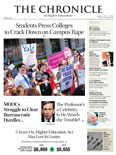Calling Philosophers of Education
Higher-education policy debates often pit economists primarily concerned about efficiency against sociologists mostly concerned about equity. But at a three-day conference I attended last week, a powerful argument was advanced that we need more input from a third group—philosophers—who can help guide policymakers and administrators on basic issues of fairness and justice.
Hosted by Spencer Foundation president Michael S. McPherson and University of Wisconsin philosophy professor Harry Brighouse, the conference ranged from discussions of whether it is permissible for psychology researchers to lie to subjects to debates over whether university endowments should include stock in tobacco companies.
In a keynote address, University of Pennsylvania President Amy Gutmann took on the big question of what makes a university education worthwhile and suggested that selective institutions should have three major aims: to promote opportunity and access; to facilitate creative understanding of the world; and to enable graduates to contribute significantly to society.
A number of discussions circled back to the central question of how universities make decisions about whom to admit. Morton O. Schapiro, the president of Northwestern University, suggested that the 5 percent of college students who are admitted to highly selective institutions benefit enormously from a lifetime of prestige and likely material well being. These students are the beneficiaries of extraordinary educational spending, on the order of $85,000 to $90,000 per year, an amount even the full-pay students don’t fully cover. He asked: are we allocating spaces in a moral way?
There was general consensus that the system could do better, though differing visions of which groups of students deserve more consideration. Lionel McPherson of Tufts University suggested that as matter of corrective justice, private institutions should provide much larger preferences in admissions to African-American applicants than they currently do. Erin Kelly, also of Tufts, urged efforts to make admissions and faculty selection more diverse by race and gender. Derek Bok, the former president of Harvard University and chair of the Spencer Foundation board, suggested that the sole focus on race and gender was old fashioned because it did not also consider the larger issue of low-income students. (According to a 2004 Century Foundation study, rich kids outnumber poor kids on the nation’s most selective 146 campuses by 25 to 1.)
Gutmann suggested selective colleges should do more to include not only low-income and working-class students, but also middle- and upper-middle-class students who are unfairly treated by current admissions policies compared with wealthy students. Citing data from 31 highly selective colleges and universities that make up the Consortium on Financing Higher Education (COFHE), Gutmann suggested that the richest quintile of students are significantly over-represented compared with the qualified applicant pool, leaving the other four-fifths of the population squeezed. The richest one-fifth of the population took up 57 percent of the slots in 2003, even though this group made up only 36 percent of those with good grades and 1,200 or more on the combined math and verbal SAT. This over-representation of 21 percentage points is compared with a particularly significant under-representation in the next two quintiles.
Coming away from the conference, I wouldn’t want decisions left to philosophers alone. When Lionel McPherson was asked about political resistance to larger preferences for African-American students, his response—I’ve given up on the public—was not reassuring to small-d democrats in the room.
But adding philosophers in a more robust way to higher-education debates would surely have a salutary effect on administrators who are now focused single-mindedly on enhancing prestige and rankings. While this may be rational for individual institutions, it was noted, for the system as a whole, this obsession undermines the moral standing of the academy.
Return to Top


